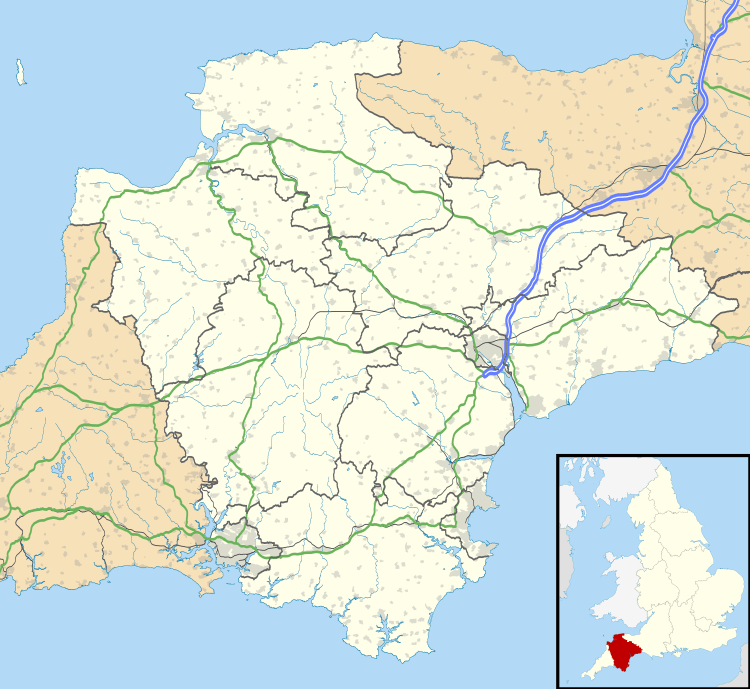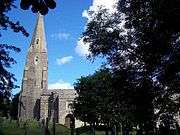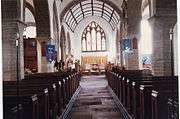Modbury
| Modbury | |
 Church Street, Modbury |
|
 Modbury |
|
| Population | 1,454 (2001)[1] |
|---|---|
| OS grid reference | SX63835946 |
| – London | 181 mi (291 km) |
| Civil parish | Harford |
| District | South Hams |
| Shire county | Devon |
| Region | South West |
| Country | England |
| Sovereign state | United Kingdom |
| Post town | IVYBRIDGE |
| Postcode district | PL21 |
| Dialling code | 01548 |
| Police | Devon and Cornwall |
| Fire | Devon and Somerset |
| Ambulance | South Western |
| EU Parliament | South West England |
| UK Parliament | South West Devon |
| Website | Modbury Parish Council website |
Coordinates: 50°20′57″N 3°53′13″W / 50.349111°N 3.886896°W
Modbury is a town and parish in the South Hams region of the English county of Devon. It is situated on the A379 road, which links it to Plymouth and Kingsbridge. The current parish population is approximately 1,500.
Etymology
The name Modbury is a corruption of the Anglo-Saxon name, Moot burgh from 'Moot' meaning either 'Mud' or 'meeting' and 'bury' meaning 'fortified enclosure'.
History
Modbury is recorded in the Domesday Book. The population of the town was greatly reduced as a consequence of the Black Death in the 14th century.
Civil war


It was the site of two battles in the English Civil War. The first battle was a minor royalist victory on 9 December 1642, when a small Royalist force put to flight a smaller Parliamentarian force.
The second Battle of Modbury occurred on 21 February 1643 when the Royalists forces, expecting an attack by Parliamentarian forces assembled at nearby Kingsbridge, had fortified the town. Outnumbered approximately four to one, and running short of ammunition, the royalists retreated. This victory was largely instrumental in the lifting of the Siege of Plymouth, and the driving of the encircling Royalist forces into Cornwall.
19th century
By 1801, the population of Modbury had risen to 1,813, with almost half engaged in the wool trade. The impact of the mechanisation of the wool industry was to have a dramatic effect on the economic prosperity and population of the town in the mid-1820s and later. Many workers left the town and headed to large cities in search of employment; others left the country altogether, emigrating to America.
The railway line bypassed Modbury, contributing still further to this decline. Modbury remained an important market town until as late as 1944 when the cattle market ceased.
Manor
The manor of Modbury was long held by the Vautort (alias Valletort) family, feudal barons of Harberton, Devon, and feudal barons of Trematon, Cornwall. It was granted, together with Bridford by Sir Roger de Vautort to Alexander de Okeston, of Okeston (alias Oxton), Devon,[2] the second husband of Joan de Vautort, widow of Ralph de Vautort, Sir Roger's elder brother.[3] Joan de Vautort was the mistress of Richard, 1st Earl of Cornwall (1209-1272), second son of King John. By Okeston she had progeny Sir James Okeston, who before he died without progeny named as his heir the son of his half-sister Joan, daughter of Earl Richard and wife of Richard Champernowne of Clyst Champernowne, near Exeter, Devon.[4] The Champernown family was thenceforth seated at Modbury. In 1700 Arthur Champernowne (1672-pre-1717) sold Modbury to Nicholas Trist and died without progeny.[5] A junior branch of the Champernowne family continued at Dartington, Devon, until 1925,[6] being descended from Sir Arthur Champernowne (d.1578) (2nd son of Sir Philip Champernowne (d.1545) of Modbury[7]), who in 1559 purchased the manor of Dartington.[8]
Historic estates
Wympston
Whympston in the parish of Modbury is a historic manor. In the 12th century it became the earliest English seat of the prominent Norman family of Fortescue, influential in British and West Country history, which survives today as Earl Fortescue, seated in Gloucestershire, but until recently seated at Castle Hill in Devon.
Orcheton
Orcheton within the parish was long a seat of the Prideaux family. The much mutilated effigy survives in the Orcheton (or Prideaux) aisle of Modbury Church of Sir John Prideaux (c.1347-1403) of Orcheton, twice a Member of Parliament for Devon in 1383 and 1388.[9]
Plastic bag ban
In April 2007 local traders declared that for environmental reasons, they would no longer give customers plastic bags.[10][11][12] This initiative led to other communities, such as Ilam in Staffordshire and Hebden Bridge in West Yorkshire, to pursue similar enterprises.[13]
Modbury Rovers F.C.
Modbury has a recreation field with a football pitch, tennis courts and a tarmac all-weather surface used mainly for skateboarding. This is the home of Modbury Rovers, who are managed by Alex Pitcher and compete in the Plymouth and West Devon Combination League.
Notable former residents
Katherine 'Kat' Ashley née Champernowne (? – 1565) governess to Elizabeth I was probably born in or near the village.
John Batterson Stetson, founder of the Stetson cowboy hat company in the US, is descended from Modbury natives Robert Stetson and Honour Tucker (who emigrated to Massachusetts c. 1634).[14]
References
- ↑ "Parish Headcounts". The Office for National Statistics. 1 April 2001. Retrieved 26 October 2010.
- ↑ "Oxton manor house on the road between Chudleigh and Exeter", per Hamilton, Dom. Adam, OSB, History of St Mary's Abbey of Buckfast, 1906, p.92
- ↑ Pole, Sir William (d.1635), Collections Towards a Description of the County of Devon, Sir John-William de la Pole (ed.), London, 1791, pp.248, 309
- ↑ Risdon, p.129
- ↑ Vivian, p.165, pedigree of Champernown
- ↑ Burke's Genealogical and Heraldic History of the Landed Gentry, 15th Edition, ed. Pirie-Gordon, H., London, 1937, p.384, pedigree of "Champernowne of Pound and formerly of Dartington"
- ↑ Vivian, pp.162-3
- ↑ Pevsner, Nikolaus & Cherry, Bridget, The Buildings of England: Devon, London, 2004, p.311
- ↑ http://www.historyofparliamentonline.org/volume/1386-1421/member/prideaux-sir-john-1347-1403
- ↑ Vidal, John (28 April 2007). "Welcome to Modbury. Just don't ask for a plastic bag". The Guardian. Retrieved 15 August 2011.
- ↑ Elliott, Valerie (28 April 2007). "Modbury (pop 1,553) is first to ban plastic bags". The Times. Retrieved 15 August 2011.
- ↑ Barkham, Patrick (12 May 2007). "World asks town that banned the plastic bag: how can we do it too?". The Guardian. Retrieved 15 August 2011.
- ↑ Sunday Telegraph 22 July 2007 2, 406 pC12
- ↑ Stetson Kindred/History
External links
- Visit Modbury – Shops and Businesses
- Modbury Heritage
- Modbury Information
- Modbury News
- Modbury Music Festival
- Aerial photo of Modbury in 1930, part of a series